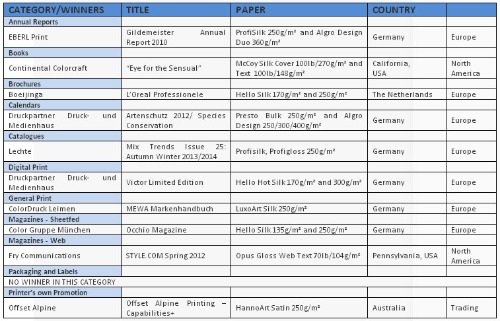Displaying items by tag: Sappi Fine Paper
Europe excels in 2012 Sappi International Printers of the Year Awards
Sappi Alfeld Mill to refocus production to meet strong growth
Lenzing AG Intensifies Pulp Cooperation with Sappi
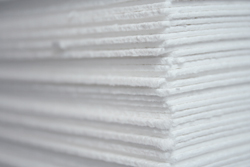 Lenzing AG, global market leader for man-made cellulose fibers, is intensifying its longstanding cooperation with the paper and pulp group Sappi. Both companies have concluded a multi-year pulp delivery contract at comparable terms and conditions with pricing linked to paper pulp as in the existing supply contract. The agreement is related to the construction of new dissolving pulp capacities by Sappi.
Lenzing AG, global market leader for man-made cellulose fibers, is intensifying its longstanding cooperation with the paper and pulp group Sappi. Both companies have concluded a multi-year pulp delivery contract at comparable terms and conditions with pricing linked to paper pulp as in the existing supply contract. The agreement is related to the construction of new dissolving pulp capacities by Sappi.
Sappi is the world’s largest manufacturer of dissolving pulp with an annual capacity of 800,000 tons at present growing to 1.3 million tons. Dissolving pulp is used in producing cellulose fibers, amongst other purposes. The raw material is wood mainly derived from certified eucalyptus plantations. Lenzing has already been sourcing high quality pulp for its non-integrated fiber production plants in Indonesia, China, Europe and the USA for several decades, including from the Sappi Group.
source: Lenzing AG
ABB awarded five-year service contract for Sappi paper mill in the Netherlands
Performance-based maintenance agreement will ensure increased mill equipment reliability and energy efficiency
ABB, the leading power and automation technology group, has been awarded a five-year Maintenance Improvement Agreement by Sappi to manage and improve all maintenance activities at their Nijmegen 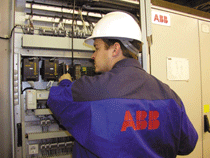 fine paper mill in the Netherlands.
fine paper mill in the Netherlands.
Under the performance-based agreement, ABB will manage all maintenance operations to improve overall productivity and equipment reliability at the mill, and retain and further develop all existing maintenance staff and management. ABB will also help the mill to reduce its energy consumption while achieving these production efficiencies.
“This Maintenance Improvement Agreement highlights ABB’s capabilities in providing comprehensive service solutions for the industrial sector. Our innovative approach to performance-based services ensures improved production and equipment performance, energy efficiency and reliability for the entire facility,”said Veli-Matti Reinikkala, head of ABB’s Process Automation division.
Sappi’s Nijmegen mill is a producer of coated fine paper located in the middle of its core market. At the Nijmegen Mill, Sappi aims to generate the economic returns necessary to maintain a sustainable business while they minimize their impact on the environment, encourage the development of people and contribute to the communities in which they operate.
“We are confident that together with ABB we will achieve an improvement in paper machine performance reliability and efficiency that, in turn, enables us to better and predictably serve our customers with great product. Equally important, we aim to provide a work environment that allows growth and achievement for our people.” says Wayne Thomas, Mill Director at Sappi Nijmegen.
Under the agreement, ABB also will focus on process optimization and equipment lifecycle management at the site, as well as manage all maintenance related third-party subcontractors and suppliers.
With more than 100 Full Service® agreements with customers in Pulp & Paper, Mining, Metals, Chemicals and other industries globally, ABB best practices and expertise improves the performance, reliability and energy efficiency of production assets, increasing plant efficiency and optimizing total maintenance cost while reducing environmental impact.
Metso to supply pulp line for production of chemical cellulose for Sappi’s Ngodwana mill in South Africa
Metso will supply a new fiberline for chemical cellulose for Sappi’s Ngodwana mill in South Africa. Start-up is scheduled for the first half of 2013. The value of the order will not be disclosed.
Metso’s delivery will include the design and supply of the main equipment for the new fiberline, from cooking to bleaching. The batch cooking plant is to be designed according to the prehydrolysis process and TwinRoll wash presses will be used in all washing positions.
The equipment to be supplied, together with Metso’s experience and know-how of this type of special pulp, will enable Sappi to produce high-quality chemical cellulose pulp for the growing market.
The new fiberline will produce around 215,000 air dried tonnes chemical cellulose hardwood pulp per year. In addition to the cooking plant and fiberline which will be new, Metso will also supply equipment for the upgrade of wood handling, evaporation and recausticizing as well as a new ash leaching system.
The main part of the order is included in Paper and Fiber Technology’s third quarter 2011 orders received and the evaporation and ash leaching equipment delivery in Energy and Environmental Technology’s third quarter 2011 orders received.
Sappi is today the world’s largest producer of chemical cellulose with a production capacity of approx. 815,000 air dried tonnes per year from the Saiccor mill. The Ngodwana mill located in the Mpumalanga province of South Africa will convert all of its market pulp production to chemical cellulose.
Sappi Fine Paper North America Sells Muskegon Mill Site
Sappi Fine Paper North America announced that Melching, Inc. has purchased the Muskegon Mill site, a former pulp mill, paper mill, and converting facility in Muskegon, Michigan. Sappi permanently ceased operations at the site in August 2009 due to industry and economic conditions. Melching is currently reviewing plans to redevelop the site for a variety of industrial uses.
"Sappi Fine Paper North America selected Melching, Inc. as the buyer based on its expertise and successful track record in addressing industrial sites, strong long term relationships in the local area and robust redevelopment plans," said Anne Ayer, Vice President, Corporate Development and Chief Information Officer
Melching, Inc. is a demolition, dismantling, and industrial remediation services company located in Nunica, Michigan. Sanabe & Associates, LLC, acted as financial advisor to Sappi for the transaction.
Metso IQ quality control systems chosen for three Sappi mills in Europe
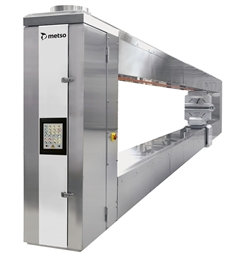 Target for the investment is to further enhance end product quality and increase raw material savings which, among other benefits, will also have a positive environmental impact.
Target for the investment is to further enhance end product quality and increase raw material savings which, among other benefits, will also have a positive environmental impact.
Metso will supply four modern Metso IQ systems to replace four aging quality control systems in three separate Sappi mills in Europe. The delivery includes a total of twelve scanners for three paper machines in Stockstadt and Maastricht as well as one coater in Alfeld, the latter also including four Metso IQ Coating Profilers.
The replacements are planned for August, September and December 2011.
Sappi Fine Paper Europe is the leading producer of coated fine paper in Europe with an annual capacity of approximately 4 million tons of coated and uncoated paper brands.
Sappi Fine Paper North America's Somerset Mill Secures Green-e® Marketplace Certification
Now Offering More Products Manufactured With Certified Renewable Electricity
BOSTON – As part of its commitment to operating sustainably, Sappi Fine Paper North America today announced that its Somerset Mill in Skowhegan, Maine, has been certified by Center for Resource Solutions' Green-e® Marketplace program. The Somerset Mill secured this qualification through new investments in renewable energy generation. Sappi invested $49 million this past fall to upgrade the Somerset pulp mill's recovery boiler and related equipment.
Prior to this recent investment, Sappi Fine Paper North America has led the industry in the use of renewable energy and already has the lowest reported carbon footprint among domestic coated paper suppliers, with more than 85% of the total energy being derived from renewable resources at its coated fine paper mills.
Under the Green-e certification, 100% percent of the electricity used to manufacture Opus web paper at the Somerset Mill is Green-e certified renewable energy 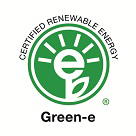 that is generated onsite by Sappi. Opus web now joins the line-up of Sappi Fine Paper North America's current Green-e certified product offerings: Sappi's McCoy web, sheets and digital; Opus sheets and digital; Opus 30 web; and Flo sheets and digital; all of which have been Green-e certified via renewable energy generated at the Cloquet Mill in Minnesota.
that is generated onsite by Sappi. Opus web now joins the line-up of Sappi Fine Paper North America's current Green-e certified product offerings: Sappi's McCoy web, sheets and digital; Opus sheets and digital; Opus 30 web; and Flo sheets and digital; all of which have been Green-e certified via renewable energy generated at the Cloquet Mill in Minnesota.
Green-e is the nation's leading, independent, third-party certification and verification program for renewable energy, ensuring that strict environmental and consumer protection standards are met.
Customers who choose one of Sappi Fine Paper North America's Green-e certified products and one of the Green-e Marketplace re:print certified printers for their print job can further leverage that they are minimizing their environmental footprint through the Green-e Marketplace re:print program.
"Green-e certification is a testament to Sappi Fine Paper North America's commitment to sustainability, which is fundamental to our business strategy," said Jennifer Miller, Executive Vice President of Marketing and Communications, Sappi Fine Paper North America. "As companies are increasingly seeking to minimize their impact on the environment, we are pleased that we can now offer our customers additional assurance through the added value of Green-e- a recognizable and credible labelling program, for many of our coated fine paper products," added Miller.
Based on the audit conducted for this certification, initial estimates indicate the amount of Green-e certified renewable electricity generated from renewable resources at Sappi's Somerset Mill is approximately 260 million kilowatt hours (kWh) annually, which is comparable to the yearly electrical usage of approximately 24,000 homes consuming nearly 11,000 kWh per year.
In addition to obtaining Green-e certification through the recovery cycle upgrade project, Sappi's Somerset Mill has also implemented several other major projects to improve energy efficiency and reduce the site's carbon footprint over the past year. This includes work underway to improve the efficiency of the pumping systems of Paper Machine Number 3 for which Sappi received an Efficiency Maine grant. Through these projects and others, the Somerset Mill continues to reduce its reliance on fossil fuels.
In 2008, already operating significantly better than industry average, Sappi established a five-year goal of reducing emissions from fossil fuels by 40% over its 2007 baseline. The metric for this goal includes both direct emissions from Sappi Fine Paper North America's mills, as well as emissions associated with purchased electricity. In terms of the Greenhouse Gas Protocol, this is known as Scope 1 and Scope 2 emissions. At the end of the company's 2010 fiscal year, Sappi had already achieved more than a 40% reduction in just three years, outpacing targets proposed by climate change legislation.
"Sappi Fine Paper North America's performance data and third-party certifications such as Green-e, demonstrate that we are leading the industry when it comes to greenhouse gas emissions and the use of renewable energy. We will continue to implement projects like these that demonstrate environmental responsibility," said Laura Thompson, Ph.D., Director of Sustainability and Technical Marketing, Sappi Fine Paper North America.
For more information about Sappi's sustainability initiatives and specifying environmentally preferable paper, visit: www.sappi.com/eQ and www.sappi.com/eQTool.
Sappi uses the ABB Optical Caliper Sensor and QCS to improve reel-building quality for its customers.
Sappi’s Somerset Mill is on a mission to continually improve its reel building quality, and the ABB Optical Caliper Sensor has helped Sappi to effectively manage optimum reel-building conditions in real-time.
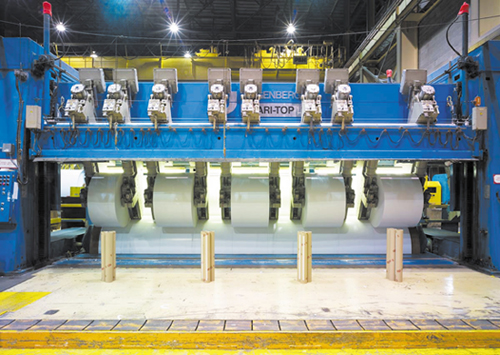
Uniform caliper is extremely important for good roll-building on coated and calendered papers. Because the paper is so dense and smooth, very little caliper profile deviation can be tolerated before the effect is seen on the hardness profile of the reel, and subsequently in the quality of the rolls coming off the winder. PM2 at Sappi’s Somerset Mill used to rely on manual off-line testing of reel hardness profiles using a hand-held hardness tester to assist with the process of troubleshooting reel-building. While this approach was sufficient to enable Sappi to meet its quality targets, the infrequency of these hardness tests represented an opportunity for Sappi to further optimize reel-building conditions, and their available manpower.
“The stability and repeatability of the Caliper Sensor allows the operator to trust the profile shape and make reel-building corrections in real-time rather than wait for an off-line hardness profile test,” says Dave Moore, Senior Process Engineer at Sappi Somerset Mill.
The Optical Caliper Sensor contacts the sheet on one side using a smooth ceramic stabilizing plate with vacuum applied by concentric rings. On the other side of the sheet is a unique optical (confocal) measurement. The confocal measurement is combined with a magnetic reference measurement, and the result is caliper measurement. The simplicity of this design provides reliable performance day after day in the harsh paper mill environment.
Even with the sensor applied very soon after the calendering process on high-gloss grades, Moore adds that, “We have not seen any sheet marking issues with this design.”
Caliper correlation within ±1% between the laboratory and the Optical Caliper Sensor was one goal of the project: “The optical sensor has met our requirement of reproducible CD profile correlation without marking the sheet surface,” reports Moore.
Equally important for Sappi was the correlation to the hand-held hardness instrument. Figure 1 shows that the correlation was good enough to allow operators to make corrections before out of specification limits were reached.
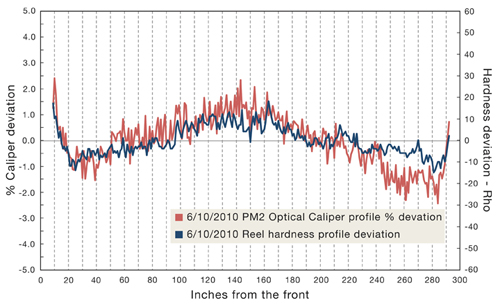
ABB has been working with the Sappi Somerset Mill to implement service and evolve its Quality Control Systems (QCS) for more than 25 years on its three paper machines. Over that period of time, ABB and Sappi have worked together to evolve the systems in a step-wise approach, with manageable capital investments.
New Masuga is Sappi’s “sweet” paper choice
Global pulp and paper producer, Sappi, has come up with another environmentally sound solution that combines the natural look of uncoated paper with the smoothness of a coated grade.
Masuga was recently launched in Johannesburg, with renowned chef Justin Bonello giving a ‘sweet cooking’ demonstration to reiterate Masuga’s branding as ‘Sappi’s sweet paper’. Masuga is produced primarily from sugar cane waste (bagasse) and wood fibre derived from sustainably certified and well managed forests.
During his demonstration, Justin highlighted the analogies between cooking and making paper. Both require specific, quality ingredients and fail-proof recipes. And in both instances, the end product is something tactile that can be touched and enjoyed in a way that no digital product can.
Masuga is also a ‘sweet’ choice for many other reasons. The development of this paper is the prime example of a manufacturer understanding and interpreting the needs of its customers, and as a result producing an innovative local grade made from alternative fibres.
“Masuga was developed in response to a specific customer request (from Woolworths) for a very smooth, uncoated environmental paper in a natural shade. This makes it the first text and cover grade of its kind on the market,” says Sappi Paper and Paper Packaging Business Develop Manager, Kathy Ormerod. The new grade is a double win for specifiers across the board. “Not only does it provide a natural-looking ‘canvas’ to unleash design creativity and provide more end-use options, but its smooth surface gives it the excellent printability and quality finish that are characteristic of a coated grade.”
The paper’s environmental and socio-economic credentials are equally impressive. It consists of 90% sugar cane waste and 10% wood fibre sourced from a Forest Stewardship Council (FSC) certified plantation. The unbleached mixture is pulped, revealing the fibres’ natural shade when turned into paper. Masuga is 100% recyclable. A further benefit is that the sugar cane mill that supplies Sappi with the sugar cane waste, is black owned; and 25% of the mill’s shareholders are local cane farmers.
Masuga was developed in response to Woolworths’ need to use a paper that supports its Good Business Journey goals of protecting the environment and empowering people. “We are fortunate to have partnered with Sappi in developing this exciting and innovative paper. Their expertise has made this possible,” says Woolworths’ Good Business Journey Manager, Justin Smith. Woolworths’ 2010 Annual and Sustainability Reports were the first documents to be printed on Masuga.
“Being a 100% locally produced paper is an added bonus,” adds Sappi’s Kathy, “as buying ‘local’ supports the economy and job creation in our country. It also assists in establishing a unique South African offering of paper that is manufactured according to the highest environmental standards; and without the big carbon footprint that is evident in many of the imported grades.
Masuga’s smoothness and natural look makes it a great choice for printing annual reports, corporate stationery, books, brochures, tags, folders etc. It is available in an extended grammage range of 100,120,170 and 350g/m² and is exclusively distributed by Antalis.

